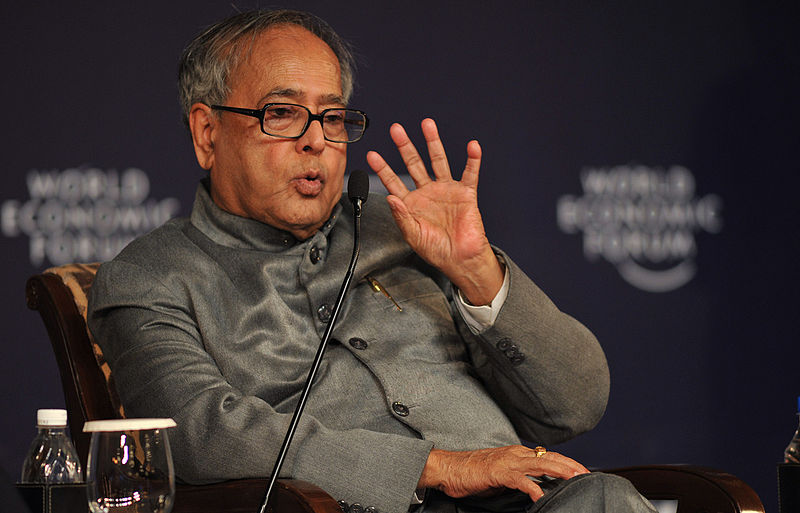The dust has finally settled on the media frenzy around the election of India’s new President. The fact that the populace was not even involved, albeit through proxy, in electing the President goes on to show how the media can make an unimportant event look like the great Indian wedding.
The reason that I consider the entire process as a mere charade (I am tempted to call the antics as shanainagans, though) rests on one fact – the President of India is a nominal head of the Republic of India. The Constitution of India vests immense powers in the President but they, except for few, must be executed through the Council of Ministers.
Let us take a look at what the new President has to deal with right away.
1. An economy in shambles
I do not expect much happening on this front from the President’s end. He is the primary reason, as attributed by many, for the economic mess that India is in. Blame it on pressure of coalition politics or bad governance, the bottom line is that the incumbent was the Finance Minister and was a spectator to the slowdown that the country is moving towards.
If he musters the courage to address the Parliament on issues pertaining to the economy, he might end up as a President who was heckled beyond belief, during his speech, with due respect.
2. Terrorists on death row
There are many a terrorists on the death row in India, whose appeals for commutation of the death sentence to a life term have been pending for want of being granted pardon by the President of India (one of the few powers that the President has in India). The first name that comes to this list is that of Afzal Guru, the alleged plotter of the terrorist attack on the Parliament of India in 2001.
Afzal Guru has been a hot potato for the ruling Congress-led UPA (United Progressive Alliance, a coalition of 10 political parties) government. It is a fact that executing Afzal Guru would have severe ramifications in Jammu and Kashmir, the state that he hails from, and the Intelligence Bureau has stated this with a straight face. We are talking about stone pelting mobs, terrorist attacks and resulting curfews.
The question is – how is it going to be starkly different from the situation in the state of Jammu and Kashmir right now?
3. Sullied name of the Presidency
The purists might not accept it but the chair of the President of India has not been denigrated to the extent that it has been in the last 5 years. The immediate ex-President, Pratibha Patil, was in the news for all the wrong reasons. Right from being a nominal state of head in spirit and conduct on visits to other nations, tagging along the entire extended family on such visits to transform them into family jaunts, having a son embroiled in alleged bribing of voters during elections in Maharashtra, commuting death sentences of over 20 criminals accused of heinous crimes to getting a palatial house constructed on Army land, Pratibha Patil has ensured that Pranab Mukherjee has a tough task at hand to uphold the hisghest office of power (supposed) in India.
4. Let go of political associations
Pranab Mukherjee has often been quoted as the ‘Prime Minister-in-waiting in the Congress’ and as ‘the man who ensures the UPA is in place’. He is a master statesman and his deliberations and negotiations are the primary reason why the UPA is still intact. The fact that just a couple of days after Pranab Mukherjee was elected as the President, a constituent of the UPA, the Nationalist Congress Party, upped the ante for more power in the UPA-led government.
It is also a fact that Pranab Mukherjee was a close advisor to UPA Chairperson Sonia Gandhi, who has been leading the Congress party, as is the norm in the party (the Gandhis lead the party). He has not been a sycophant, to state the least, like the other ‘big names’ in the party. He played his part according to what the protocol required.
It would be interesting to see how he enforces the edicts laid out in the COnstitution of India for ensuring political amity in the country. The Opposition, led by BJP (Bharatiya Janata Party) would rally against the President at any hint of nepotism shown towards the Congress or the UPA. I am eagerly waiting for the political games to begin with Gujarat going to polls in December and Karnataka early next year. Both these states are ruled by BJP. There are 10 states that go to polls in 2013 and 3 of them are under BJP.
5. Undertake a diplomatic Blitzkrieg
Let’s admit, there is one aspect of the job description that the President of India can leverage to the benefit of the nation and that is of the official PR respresentative of the country. The people of this country have known foreign trips of the immediate ex-president in the wrong light. Pranab Mukherjee, the statesman, has it in him to give a much required facelift to the sagging image of India on the global front. In PR terms – he has the contacts.
It would be great to finally have a President who can take up this job and work with utmost vigor to come forth as a helping hand to the Wimbledon-loving External Affairs Minister that we have in S M Krishna.
It is going to be an interesting 5 years in the office for the new President with the General Elections scheduled to be held in the next 2 years. Will he continue to guide the Congress party (old habits die hard) or will he uphold the dignity of the chair of the President of India? Wait and watch.

